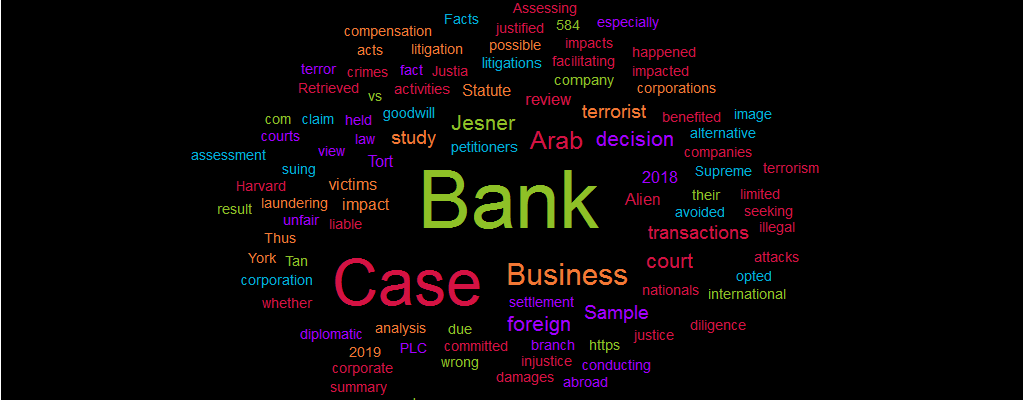Business Case study Sample
Publication Date:

Executive summary
This was an assessment of the Jesner vs. Arab Bank case. The petitioners were suing for damages caused as a result of the bank facilitating transactions the benefited terrorist activities. It was held that foreign corporations cannot be liable under the Alien Tort Statute and that foreign nationals cannot claim damages under the same law. The decision was found to be unfair since the victims hardly found justice. The company could have avoided the litigations by conducting due diligence on international transactions. They could also have opted for an out of courts settlement. At the moment, the goodwill of the bank has been damaged as many view the firm as a terrorist sympathizer.
Introduction
Case analysis provides an avenue for professionals and students to assess the possible impacts of various litigations on their business. Thus, such an analysis is well justified in the present environment where litigations are a common occurrence for many business enterprises. In the next sections, a review of one case will be done in a bid to gain insights into the impacts of litigations on businesses. The case will be presented, followed by the decision of the court. Next, the analysis will review the impact of the decision and the possible alternative means of resolutions that could have been adopted in the case. A review of how the case impacted the goodwill of the business will conclude the evaluation.
Facts of the case
Jesner vs. Arab Bank is the case selected for this review. In the case, the petitioners, Joseph Jesner and about 6,000 other foreign nationals sought compensation from the Arab Bank under the Alien Tort Statute for terrorist acts committed abroad (Justia US Supreme Court, 2018). They accused the Jordanian bank with a branch in New York for facilitating terrorist activities by clearing dollar-denominated transactions that benefited terrorists and laundering money for a Texas Based charity that was affiliated with the Hamas terrorist group.
Decision of the court
It was held that the bank was not liable under the Alien Tort Statute because most of the petitioners were foreign nationals suing a foreign corporation (Harvard Law Review, 2018). The only connection to the US that emerged from the case was the fact that the Arab Bank facilitated transactions using its New York Branch. This was viewed as an insufficient ground for connecting the bank to the US for it to be liable under the Alien Tort Statute. It was further noted that it would be wrong to extend liability under the Alien Tort Statute to foreign entities as this would lead to diplomatic and political issues that the US courts were incapable of handling.
Was the decision fair and just
The decision seems a bit unfair on the victims of the terrorist attacks. They were seeking a legal remedy for an injustice that existed. The court was not in doubt as to whether the bank committed the illegal acts or whether the act led to injury on the part of the victims. On the contrary, these facts were acknowledged.Nevertheless, the victims were denied justice for the simple fact that the corporation was foreign and that they were foreigners. This was despite the fact that the US had a role to play in the injustice noting that the illegal transactions happened in the country. The reasons provided such as to avoid diplomatic wars sound minor as compared to the injustice suffered by the victims of the terror attacks.
How the company could have avoided the litigation
The company could have avoided litigation by conducting due diligence before facilitating international transactions. This would enable them to flag suspicious transactions that may be going to terror activities. Eventually, the crime of money laundering would have been averted. If the laundering still happened, the bank could prove that the same was not their fault.
Impact of the court’s decision
The decision has far-reaching implications for foreign multinational corporations with limited presence in the US. In essence, such companies are immune to prosecution for crimes they commit to non-US citizens, especially if the crimes happen outside the country (Tan, 2019). This is dangerous. The companies may abuse the privilege to perpetrate more crimes with limited or no consequences.
Was alternative dispute resolution possible?
The Arab Bank could have opted for an out of court settlement for the litigation. The petitioners were seeking compensation for a wrong that the bank knew they had committed. Thus, the claim was justified. Settling the issue out of court could have prevented the global attention that the bank attracted during the case.
Does the case impact business goodwill?
The case certainly impacted the goodwill of the business. People all over the world now view the bank as a major facilitator of terrorist activities. They also view it as an entity that is not willing to be held accountable for its wrong. The overall corporate image of the company has been destroyed and may take years to rebuild. This may affect the performance of the bank both in the US and abroad. Customers, especially those that are against terrorism, are likely to refrain from working with the bank. Other companies that are keen on their corporate image are also unlikely to work with the bank as consumers may interpret this as supporting terrorism.
References
Harvard Law Review. (2018). Jesner v. Arab Bank, PLC. Retrieved from https://harvardlawreview.org/2018/11/jesner-v-arab-bank-plc/
Justia US Supreme Court. (2018). Jesner v. Arab Bank, PLC, 584 U.S. Retrieved from https://supreme.justia.com/cases/federal/us/584/16-499/
Tan. (2019, January 6). Assessing the Impact of Jesner v. Arab Bank. Retrieved from https://www.lawfareblog.com/assessing-impact-jesner-v-arab-bank